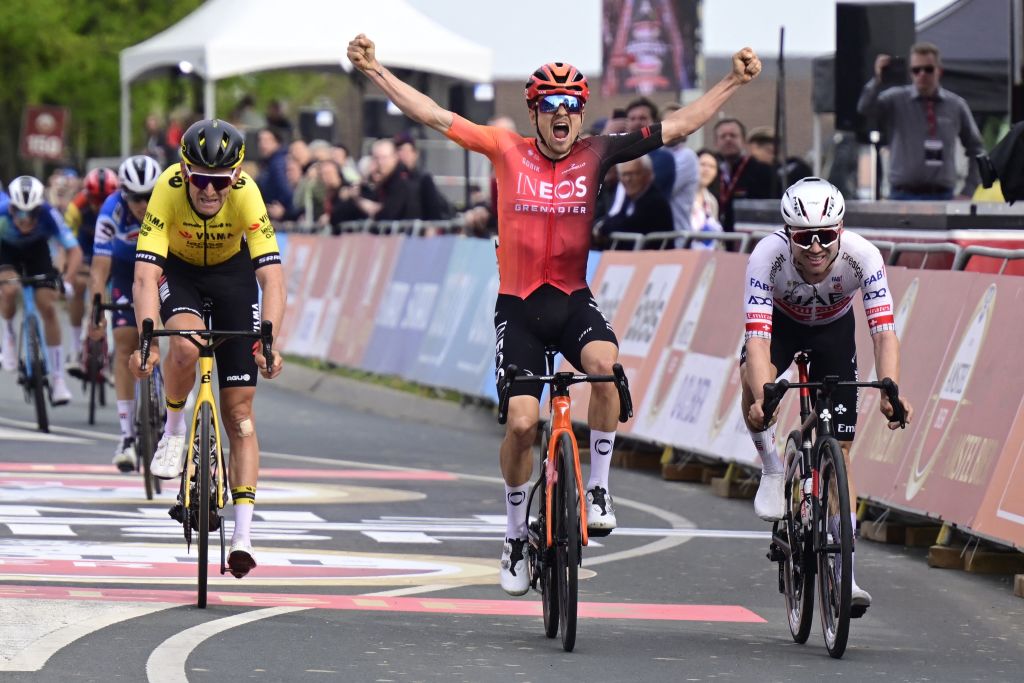
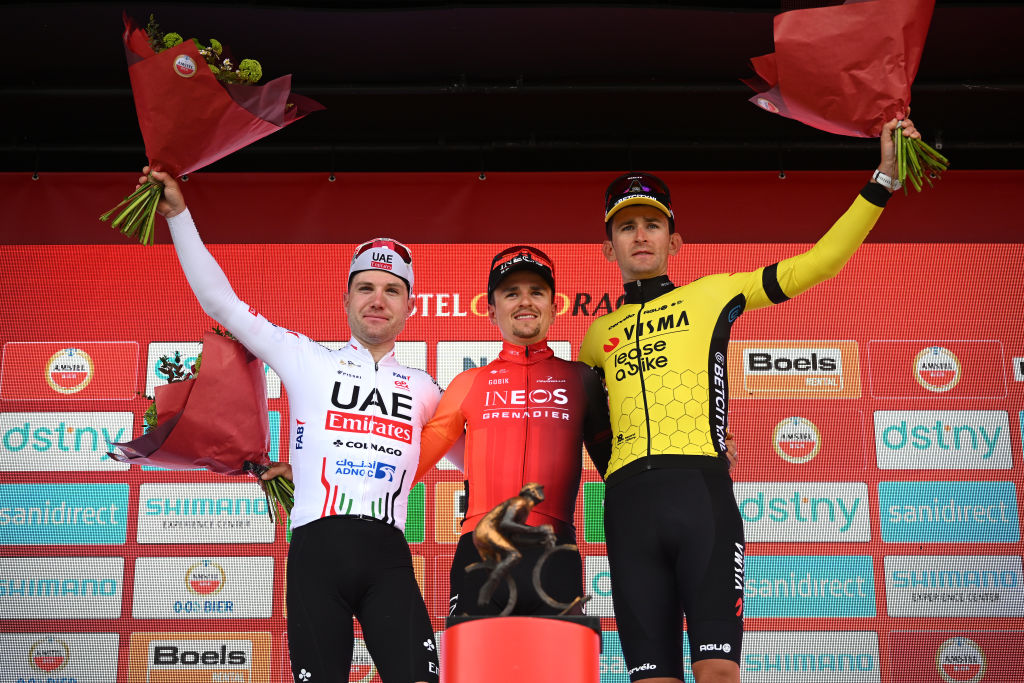
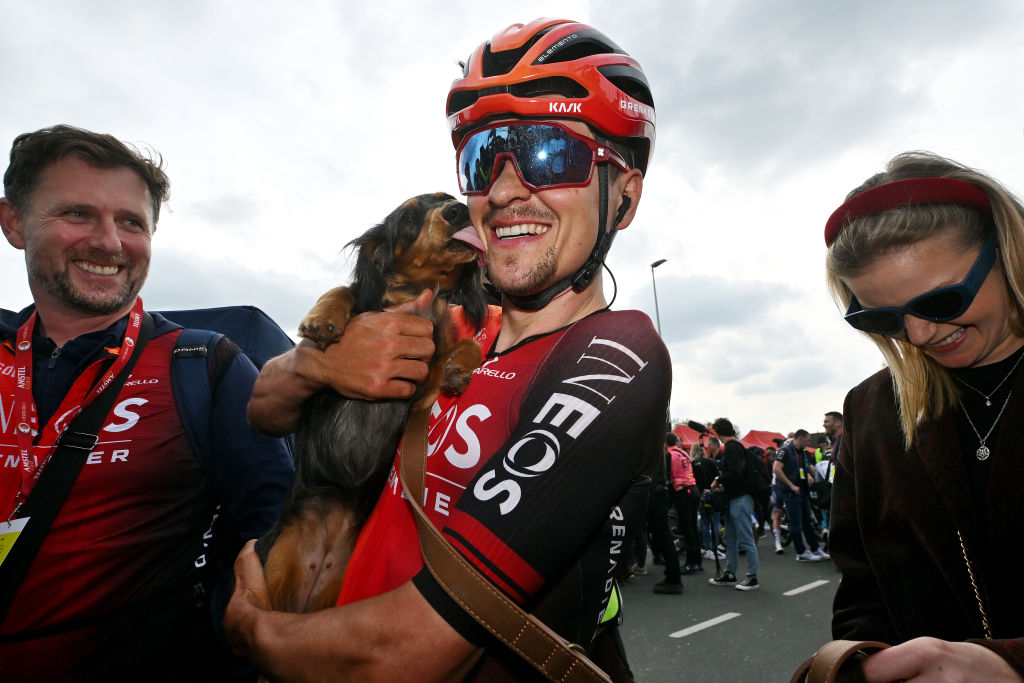

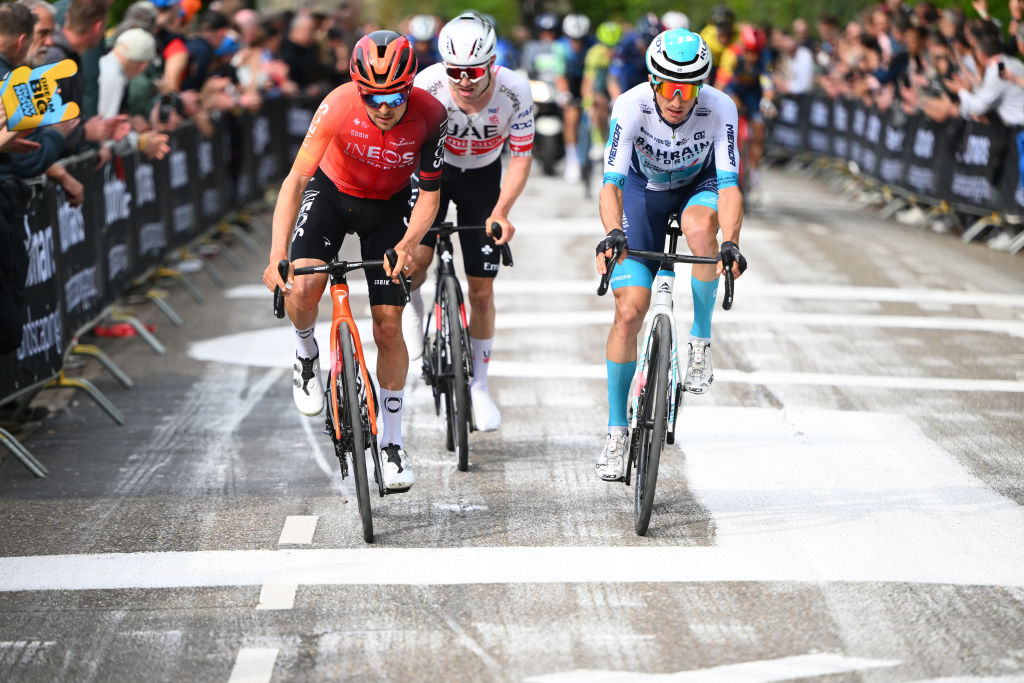
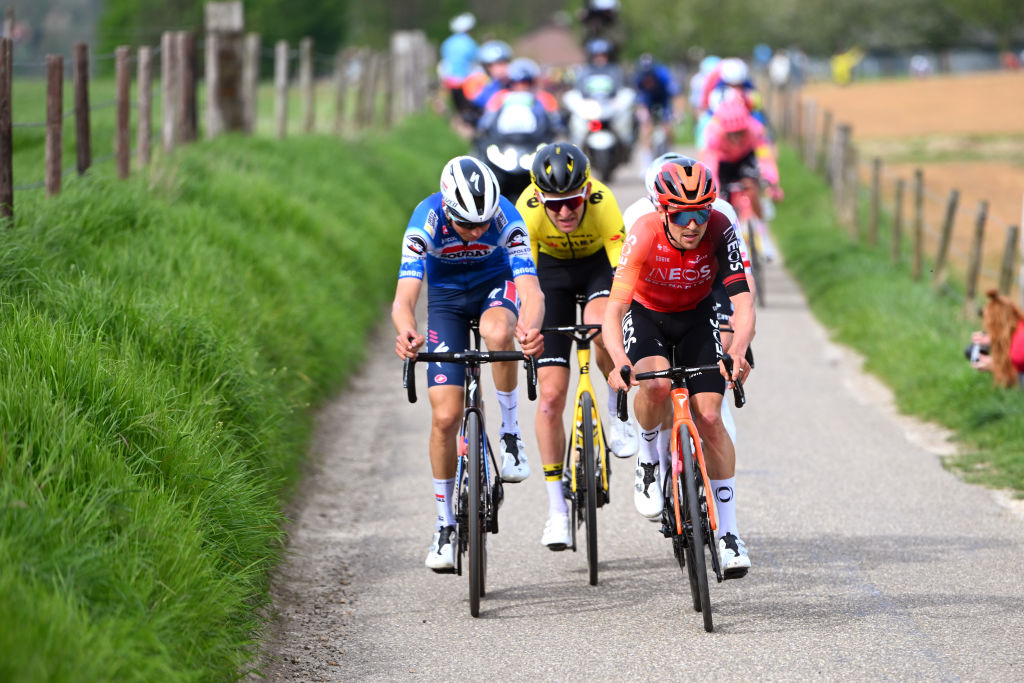
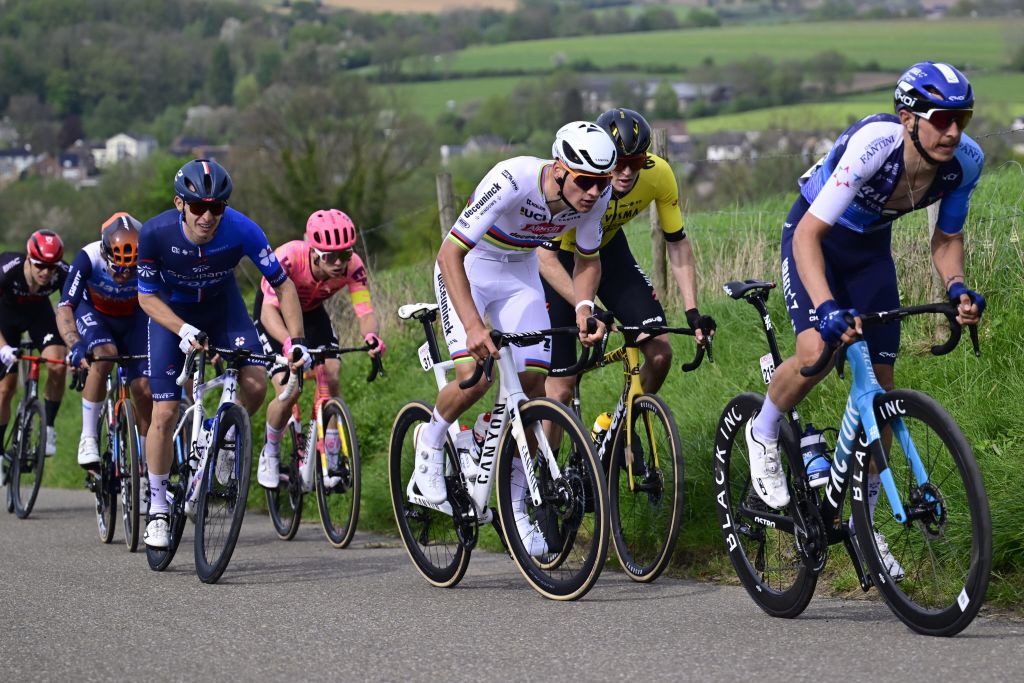
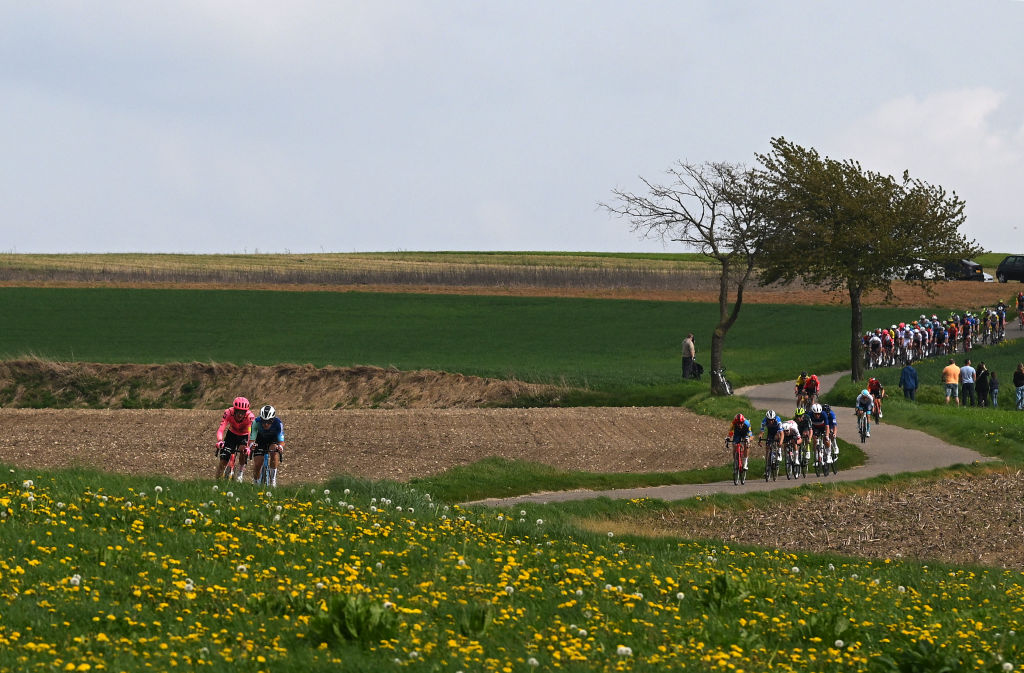
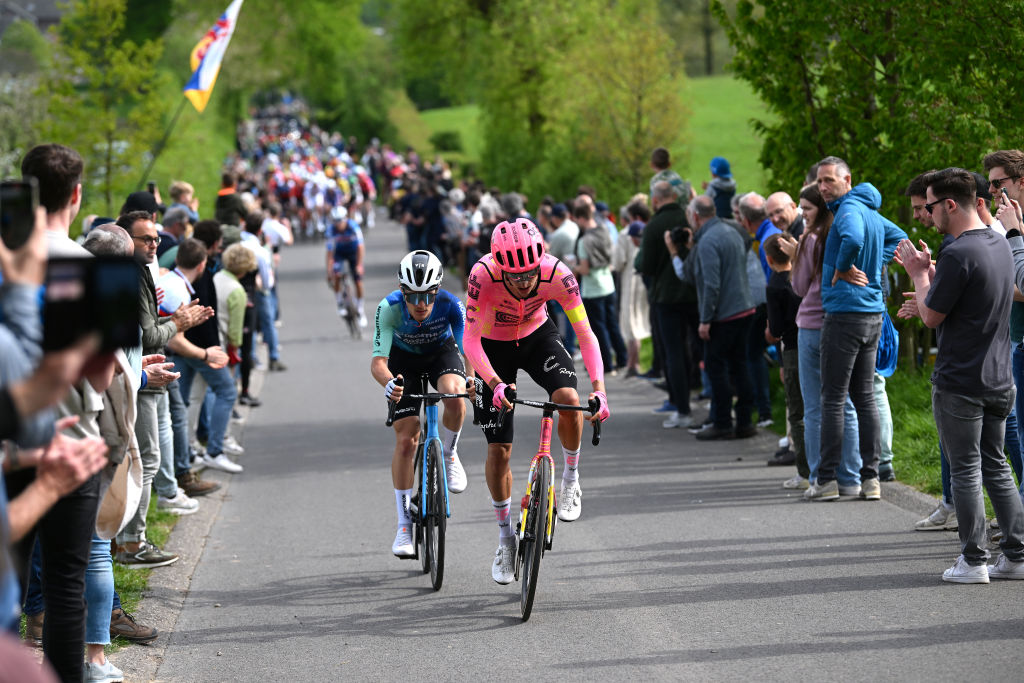
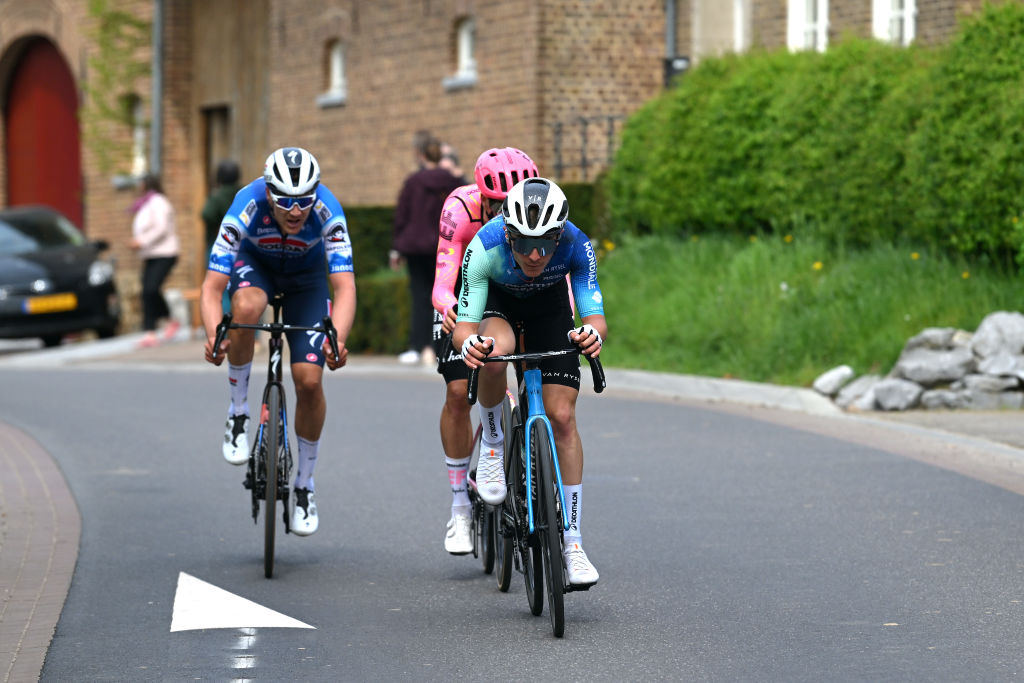
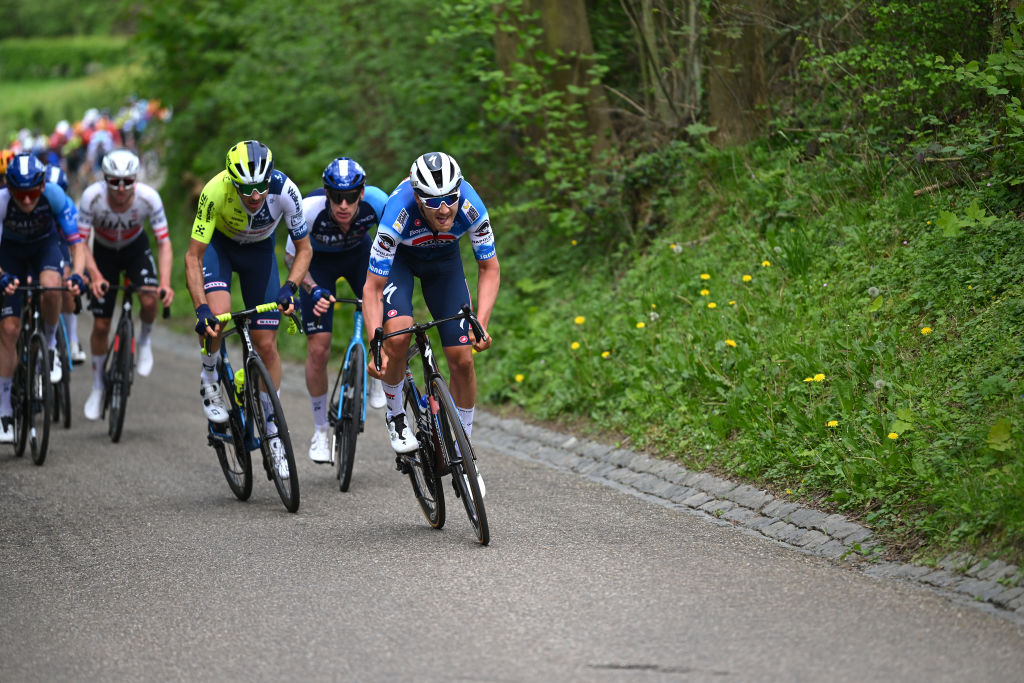
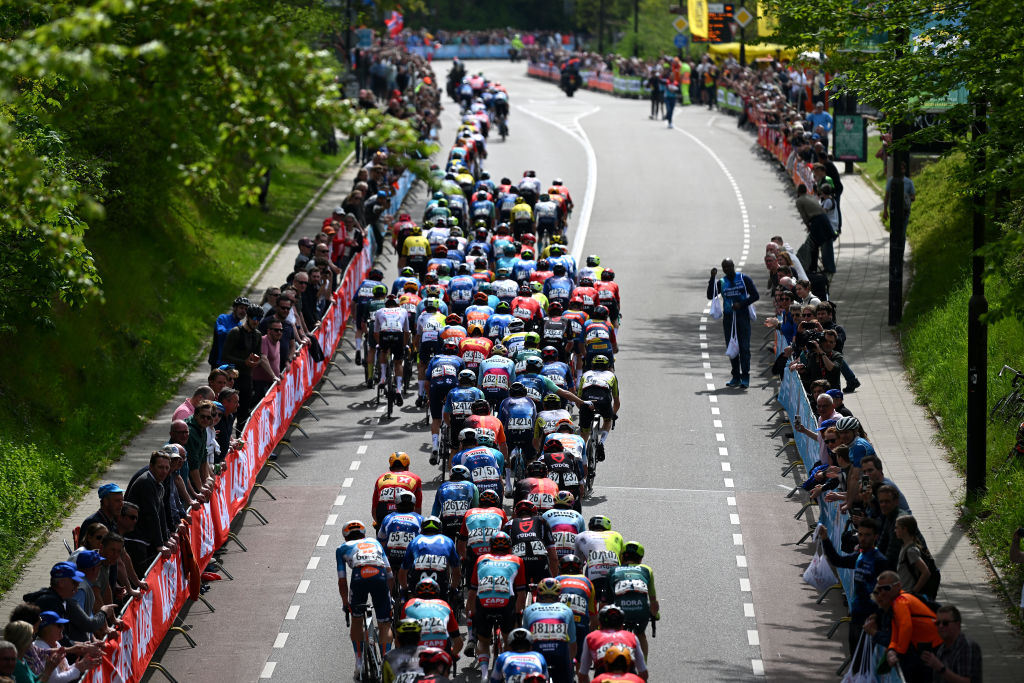
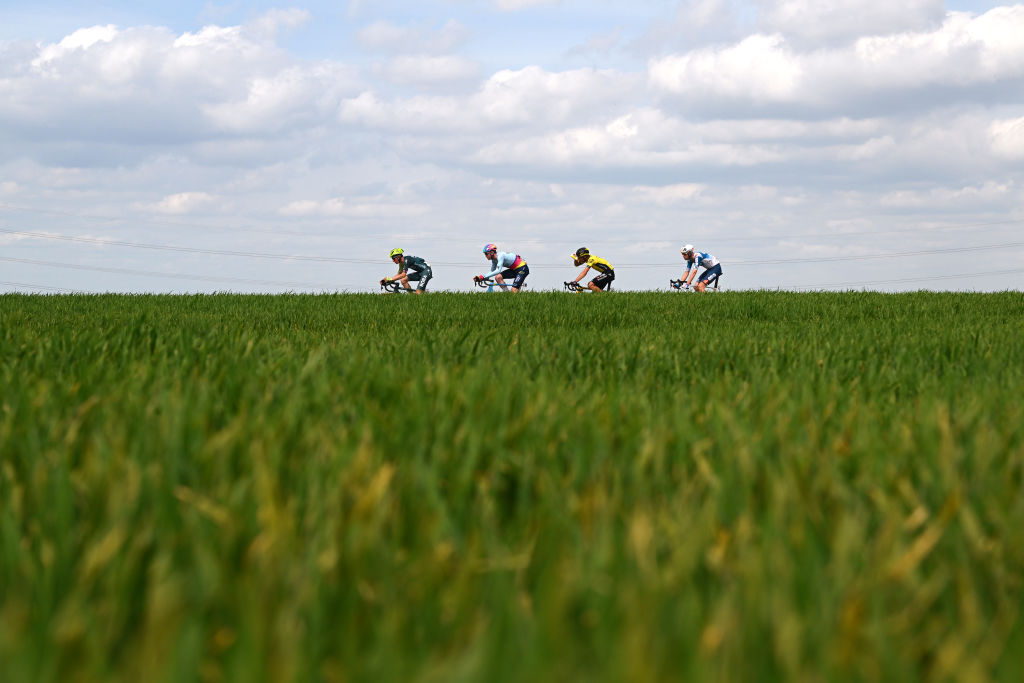
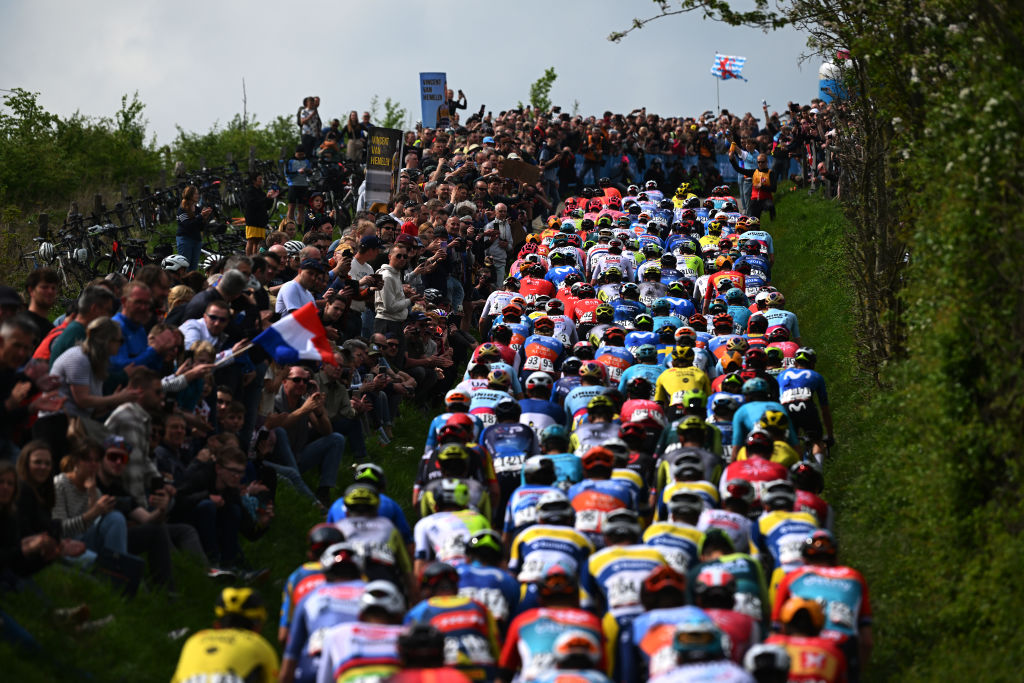
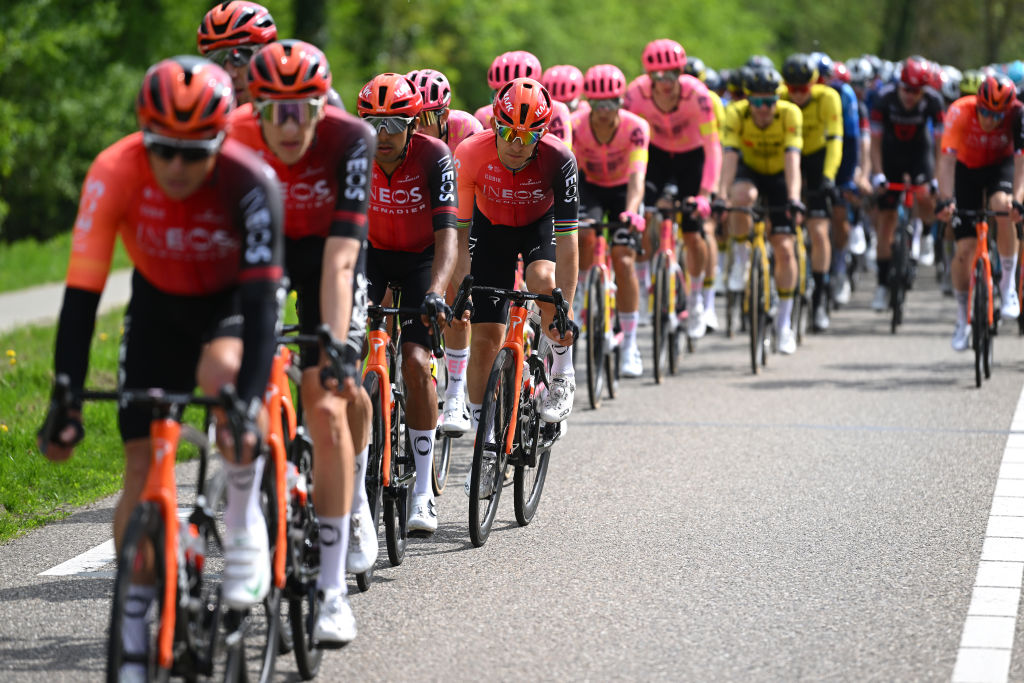

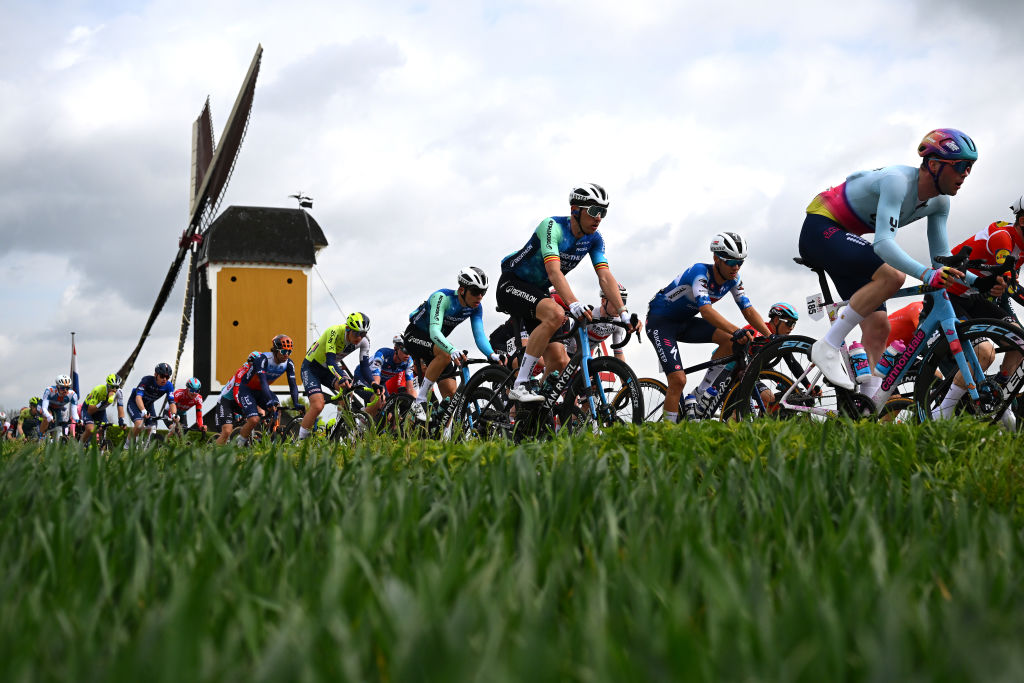
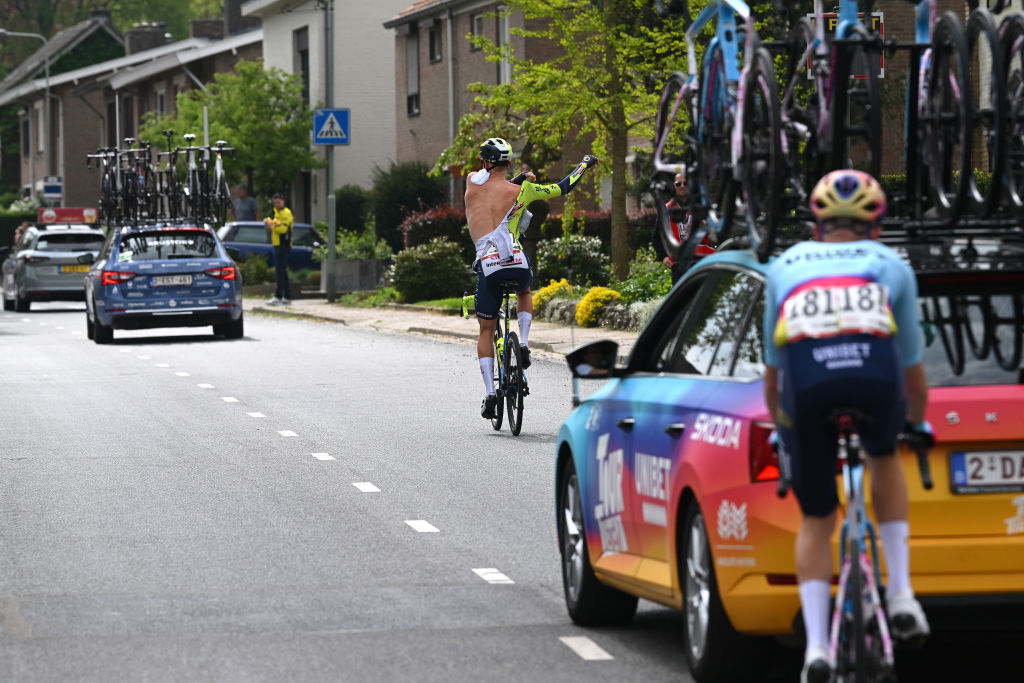
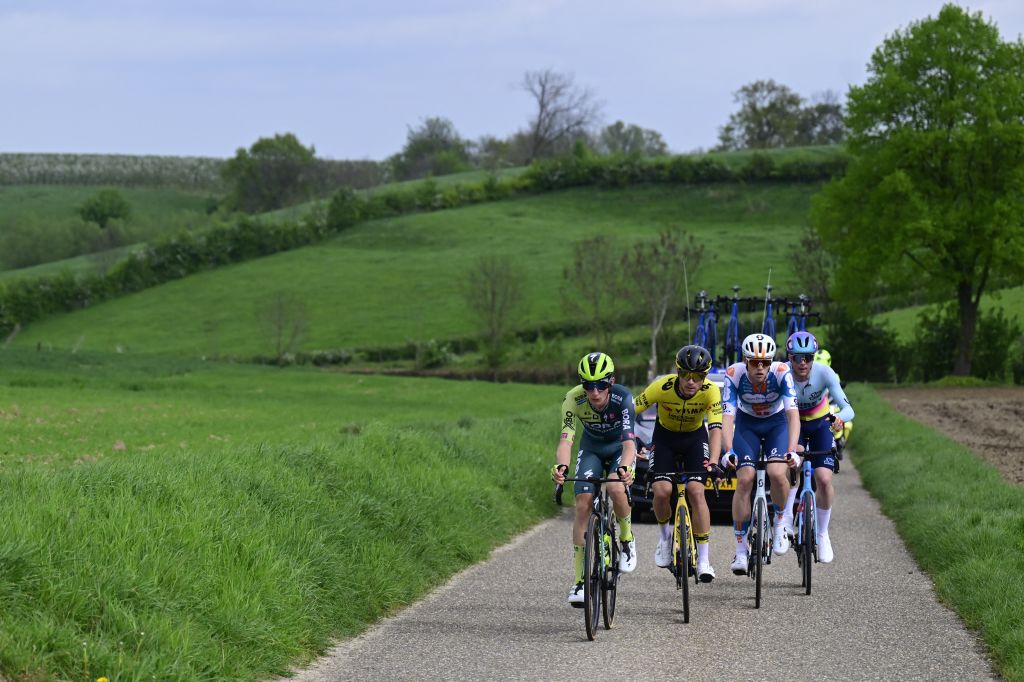
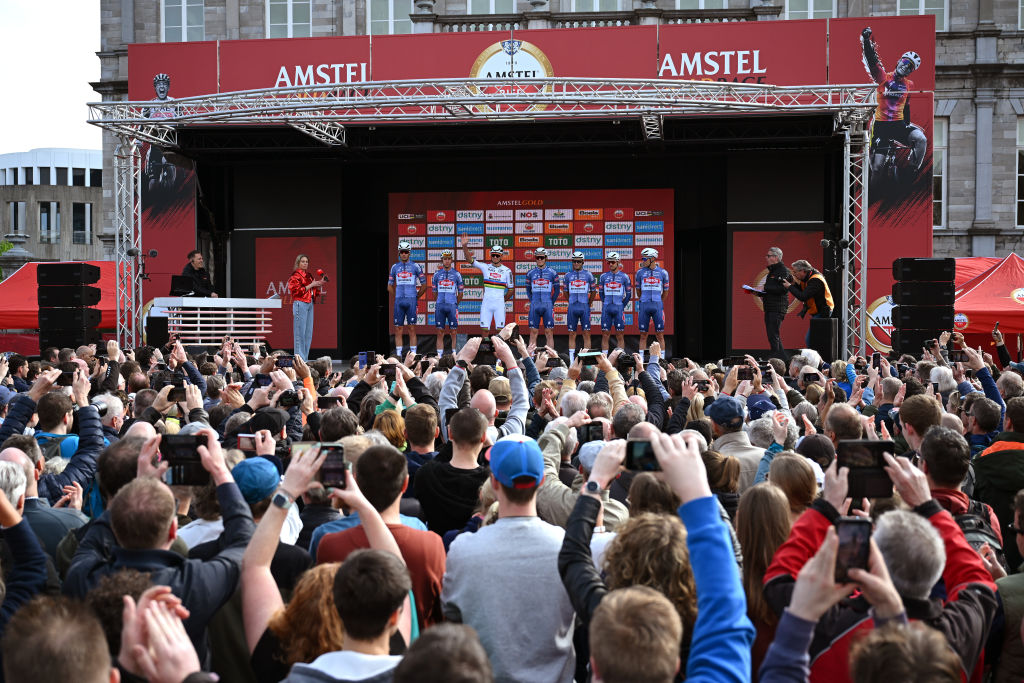
Tom Pidcock (Ineos Grenadiers) won Amstel Gold Race after edging a four-up sprint, atoning for his near miss in similar circumstances three years ago.
The Briton beat a resolute Marc Hirschi (UAE Team Emirates) to the line, while Tiesj Benoot (Visma-Lease A Bike) took third ahead of Mauri Vansevenant (Soudal-QuickStep).
“I was going to say it’s great to win for the second time but that might great some controversy,” Pidock smiled afterwards as he cast mind back to his photo-finish loss against Wout van Aert. “It feels really good.”
Pidcock, Hirschi, Benoot and Vansevenant were part of an initial twelve-man move that took shape over the top of the Eyserbosweg with 35km remaining, and they proceeded to press clear of their breakaway companions over the penultimate climb of the Geulhemmerberg.
By that point, it was already clear that the overwhelming favourite Mathieu van der Poel (Alpecin-Deceuninck) would not repeat his dramatic comeback win of 2019. The world champion and his team missed the decisive move, and with eleven rival squads represented out in front, Van der Poel never truly looked like getting back on terms in the finale.
Pidcock was the obvious favourite in the break, and his odds rose still further when the front group was reduced to four in the final 10km. He was not, however, entirely sure of his sprint, given that the palms of his hands still bore the blistered effects of riding Paris-Roubaix last weekend.
With that in mind, Pidcock attempted to forge clear alone on the final haul up the Bemelerberg, but he was unable to shake off Benoot et al. Still, his effort did help to ensure that the chasers – which included Bauke Mollema (Lidl-Trek), Pello Bilbao (Bahrain Victorious) and an impressive Paul Lapeira (Decathlon-AG2R) – would not get back on.
“This week I was struggling to sprint because of my hands after Roubaix,” Pidcock explained. “I had a lot of shoulder pain because I couldn’t hold my bars properly, so I was not so confident for a sprint, but that’s just how it was going to end up.”
Benoot tried to surprise Pidcock and Hirschi with an attack beneath the flamme rouge, but the Belgian was unable to get a gap. A flagging Vansevenant, meanwhile, was eager to guarantee himself at least a fourth-place finish, and he willingly led out the sprint from a distance.
Pidcock’s turn of speed proved enough to claim the spoils, though Hirschi pushed him most of the way as he recorded his best result in a race of this magnitude since he won Flèche Wallonne in 2020. Benoot took the third step of the podium, while Vansevenant held off the rapidly closing Lapeira for fourth.
Van der Poel had to settle for 22nd place after coming home in the main peloton, 11 seconds down on Pidcock.
“Since the start of the year I made big sacrifices and I’ve been away from home so much, so to finally put it together and get my hands in the air, it means so much,” Pidcock said. “I’ve always loved this race. It’s pretty special.”
How it unfolded
Van der Poel’s outsized exploits this Spring meant that much of the conjecture before Amstel Gold Race seemed focused on how precisely the Dutchman was going to win rather than on who might actually beat him.
Last year’s remarkable Amstel Gold Race, where Tadej Pogačar soloed home from a distance, had heightened expectations still further for the kind of solo exhibition Van der Poel might produce.
Instead, however, this was an edition more in keeping with the longstanding traditions of Amstel Gold Race. It proved to be a slow-burning race of attrition for much of the day, before morphing into a race that rewarded quick-thinking in the final hour or so.
The early entertainment was provided by a four-man break that featured Tosh van der Sande (Visma-Lease A Bike), Enzo Leijnse (DSM-Firmenich-PostNL), Alexander Hajek (Bora-Hansgrohe) and Zeb Kyffin (TDT-Unibet Cycling Team).
The quartet built a lead of three minutes by the time they reached the 50km mark, by which point Ineos Grenadiers and Alpecin-Deceuninck had begun to control the peloton. The leaders would stretch their advantage out to five minutes with 130km to go, before the litany of climbs and the intensity of the race gradually whittled away at the gap.
The peloton faced 32 climbs in total, with the early ascent of the Bergseweg removed from the course in order to avoid the scene of the police motorcycle accident that had blocked the road and forced the neutralisation of the women’s race.
With 100km to go, the break’s lead was down to three minutes, and it shrank quickly thereafter, notably when Bob Jungels (Bora-Hansgrohe) attempted to bring a group clear of the bunch on the first time up the Cauberg.
That effort petered out, but it helped to doom the break and it signalled a new phase in the race. Mikkel Honoré (EF Education-EasyPost) and Louis Vervaeke (Soudal-QuickStep), already prominent at the front, went clear after the Bemelerberg with 60km to go in the company of Lapeira.
This trio never had a lead of more than 20 seconds, but their attack helped to wear down Alpecin-Deceuninck’s resources ahead of the finale, and some enterprising riders were starting to take note.
Quinten Hermans had led Van der Poel and the peloton onto the Eyserbosweg, and the winning would take shape over the top of the climb with 35km to go. After an effort from Richard Carapaz (EF Education-EasyPost) was snuffed out by Van der Poel in person, Hirschi sensed his opportunity.
The Swiss rider punched clear with Mollema, Valentin Madouas (Groupama-FDJ) and Roger Adria (Bora-Hansgrohe), and they picked up the remaining escapees Lapeira and Honoré to form a group of six.
The break swelled to a dozen riders ahead of the Keutenberg with 30km to go, when Pidcock, Benoot, Bilbao, Vansevenant, Quentin Pacher (Groupama-FDJ) and Kevin Vauquelin (Arkea-B&B) bridged across.
“I think everyone was looking at each other at this time in the race,” Pidcock said. “I put in one attack and then another. We were the last guys to get across the front: it’s not always about legs.”
Behind, Van der Poel was now relatively isolated, and he seemed content to allow others to lead the chase, with Jayco-Alula and Israel Premier Tech prominent, but the break’s lead would yawn out to 40 seconds as they entered the final 25km.
Pidcock, Hirschi et al had 43 seconds in hand by the time they hit the Cauberg for the final time with 18km to go. One wondered if Van der Poel would use the climb to try to bridge across, but the only frisson in the bunch was provided by a brief acceleration from Mattias Skjelmose (Lidl-Trek).
EF Education-EasyPost joined the pursuit when Honoré was dropped from the front group, but the efforts of Carapaz made little inroads into the lead of the escapees, who still had more than half a minute in hand as they approached the final two climbs.
“We expected much more from Mathieu,” said Pidcock’s teammate Michal Kwiatkowski. “But his eyes are on Liège, I suppose.”
Pidcock, of course, will have designs on the race too after his display here. The Briton placed second at Liège-Bastogne-Liège a year ago, and he will approach La Doyenne with confidence, despite the presence of Pogacar and Van der Poel.
“Now the pressure’s off,” Pidcock said. “We can just go and race this week. We can do our best and, dare I say, enjoy them.”
Results
Results powered by FirstCycling







